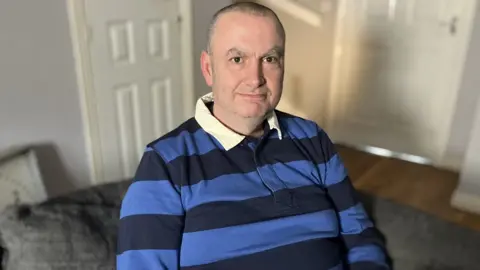Autistic people held back by job interview questions - report
 BBC/Munaza Rafiq
BBC/Munaza RafiqAmbiguous interview questions and application forms are keeping autistic people out of work, a report has found.
While 53.6% of all disabled people are in work, only 30% of autistic people are, the latest official figures show.
One autistic person told BBC News having more tick-boxes in applications might help him to land an interview.
The government has urged employers to "get behind" all recommendations set out in Sir Robert Buckland's report on autism in the workplace.
Autism is a developmental disability that affects how people perceive the world and interact with others. The Buckland review says there are around a million people with an autism diagnosis in the UK.
Adam Murphy, from Cheltenham, says he is ready for a job after more than 20 years as a full-time carer for his son Ryan, who is autistic and has learning disabilities.
'Frustrating' lack of support
But Mr Murphy, who is also autistic, has applied for six jobs since October with no success so far.
He has difficulty filling out forms so usually asks to talk through application questions with an employer over the phone instead - but says some workplaces refuse his request.
"Somebody gave me feedback and said: 'Well, we can't help everybody because all autistic people are different, and we can't put reasonable adjustments in place for everybody'," Mr Murphy said.
Mr Murphy says having tick-boxes in applications instead of free-form text-boxes, and getting interview questions in advance, are among the other adjustments that would help him.
He describes the rejected requests for support as "really frustrating", adding: "If we're not putting the basics into place to begin with to allow those autistic people to apply, then that's failing them."
The Buckland review said that for certain jobs, there was evidence that autistic staff could be more productive than neurotypical staff.
The report sets out how businesses and government can work together over the next five years. It lists 19 recommendations for both, including:
- signing up for an employers' index, to access guidance on designing inclusive processes
- offering career-progression training focused on autistic staff
- ensuring careers advisers can give appropriate advice to autistic jobseekers
The Equality Act 2010 made it harder for employers to unfairly screen out disabled people and ensured there was a duty to make reasonable adjustments for people at a substantial disadvantage because of their disability - and some businesses are already championing autistic people in the workplace.
Since opening in 2019, Cafe Track in Northampton has supported more than 120 autistic people into paid employment and work placements.
 BBC News/Munaza Rafiq
BBC News/Munaza RafiqEx-teacher Thomas Cliffe set up the social enterprise after feeling "angered" by the lack of employment prospects for autistic people.
He trains and supports businesses to help make their workplaces more accessible.
"It's not a nice thing to do to employ an autistic person - it's a good business choice," he says.
'Adjustments help me feel safe at work'
Almost all of the staff at CubeLynx in central London - one of hundreds of firms that fed into the Buckland review - are autistic.
One of those is Darcey Isaacs, who has been given various reasonable adjustments to help her work: she works part-time on a very flexible schedule, has access to quiet rooms during the day and uses noise-cancelling headphones.
"Having reasonable adjustments can help me feel safe and valued, and contribute to the company," she says.
"I am more than just a woman with a disability."
Ms Isaacs says autistic people's unique needs, skills, strengths and weaknesses vary - "just like neurotypical people".
 CubeLynx
CubeLynxDr James Cusack, chief executive of research charity, Autistica, said: "To be their best and to ensure they can get the best out of their whole workforce, including autistic people, employers need to change the way that they recruit and support staff.
"This is not about reasonable adjustments for a small number of people - it's about changes that benefit everyone, because we all think and work differently."
The review was led by Sir Robert Buckland, who told BBC Breakfast that changing interview processes could help to identify those without an autism diagnosis who "might not even think of themselves as neurodiverse".
He added: "There is no such thing as 'normal', I learnt that a long time ago as a parent bringing up an autistic youngster and I rejoice in that."

Have you been affected by the issues raised in this story? Share your experiences by emailing [email protected].
Please include a contact number if you are willing to speak to a BBC journalist. You can also get in touch in the following ways:
- WhatsApp: +44 7756 165803
- Tweet: @BBC_HaveYourSay
- Upload pictures or video
- Please read our terms & conditions and privacy policy
If you are reading this page and can't see the form you will need to visit the mobile version of the BBC website to submit your question or comment or you can email us at [email protected]. Please include your name, age and location with any submission.
